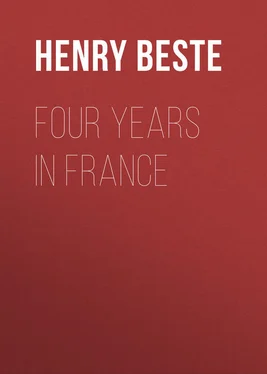Henry Beste - Four Years in France
Здесь есть возможность читать онлайн «Henry Beste - Four Years in France» — ознакомительный отрывок электронной книги совершенно бесплатно, а после прочтения отрывка купить полную версию. В некоторых случаях можно слушать аудио, скачать через торрент в формате fb2 и присутствует краткое содержание. Жанр: foreign_antique, foreign_prose, Путешествия и география, на английском языке. Описание произведения, (предисловие) а так же отзывы посетителей доступны на портале библиотеки ЛибКат.
- Название:Four Years in France
- Автор:
- Жанр:
- Год:неизвестен
- ISBN:нет данных
- Рейтинг книги:4 / 5. Голосов: 1
-
Избранное:Добавить в избранное
- Отзывы:
-
Ваша оценка:
- 80
- 1
- 2
- 3
- 4
- 5
Four Years in France: краткое содержание, описание и аннотация
Предлагаем к чтению аннотацию, описание, краткое содержание или предисловие (зависит от того, что написал сам автор книги «Four Years in France»). Если вы не нашли необходимую информацию о книге — напишите в комментариях, мы постараемся отыскать её.
Four Years in France — читать онлайн ознакомительный отрывок
Ниже представлен текст книги, разбитый по страницам. Система сохранения места последней прочитанной страницы, позволяет с удобством читать онлайн бесплатно книгу «Four Years in France», без необходимости каждый раз заново искать на чём Вы остановились. Поставьте закладку, и сможете в любой момент перейти на страницу, на которой закончили чтение.
Интервал:
Закладка:
The same motives which influenced me to this step, induced me also, three months afterwards, to take the curacy of a large parish in Lincoln; to engage, that is, to do the duties of him qui curat , as far as my inferior degree of deacon permitted. The stipend, about one fifth of the wages of an able mechanic, was known to be no object with me: I had an income more than sufficient for my wants as a single man, and, besides, lived in the house of my mother. As usual, in similar cases, some applauded my zeal, while others laughed at it.
Within a few months, a fellowship became vacant on my county. I went up to college to pronounce my probationary oration. In this discourse, enumerating the former worthies of the house, I commended our predecessors at the time of the Reformation for having been of the number of those who did not wish that reformation to be excessive — nimia was the word; and of those who did not think, "the further from Rome, the nearer to truth." The orator, on this occasion, is introduced between the first and second course of the grand dinner of the 22d of July; his voice may be clear as his stomach is empty: his task completed, he is placed at the right hand of him who presides at the "strangers' table," ranged down the middle of the hall, and is served with the first slice of the haunch of venison. I took the place reserved for me; and not perceiving that my high church sentiments had displeased any of my auditors, found the second course of a public dinner, under such glorious and hopeful circumstances, an ample amends for being excluded from the first.
I was so much pleased with a college life, that I determined to return to my abode in college, on my admission as actual fellow. I thought I had done enough to testify my devotion to the church by one year's volunteer service of the parish of St. Martin; for volunteer it was in the spirit, and almost in the letter. "Let all those who look for high preferment in the church, do as much," said I. My mother, who seemed quite to have forgotten the Rheims Translation of the New Testament, of which I was too besotted to remind her, received my promise to pass two or three months of every year with her. I soon found myself settled in a handsome apartment of the new building of Magdalen College.
It is the usage to require of every one, to be admitted actual fellow of Magdalen College, what is called a probationary exercise. On this occasion I composed a treatise, bearing for title, "The Christian Religion briefly defended against the Republicans and Levellers of France." There was no especial reason for levelling this treatise against the French levellers; but the French republic was, at this time, in England, the black dog upon every occasion: my work was a defence of general Christianity, upon a plan suggested by the pensées de Pascal . I had, however, my quarrel with the French legislators for making marriage a municipal ceremony and permitting divorce. I had not a sense of justice clear enough to blame the English law, for insisting that the marriages of catholics and dissenters shall be celebrated according to the rite of the English church. I did not bring forward the remark, that divorce is permitted in England; nor did I observe, that by the French law on the subject, no yoke was imposed on the conscience, since no married persons were required to divorce themselves, but only allowed to do so. I am entirely of opinion that such a law is highly to be reprobated in a civil point of view; but in what concerns religion, let each man's conscience take care of itself.
But my main grief against the French legislators was the plunder and degradation of their church. In treating this matter, I as much forgot, as if I had never heard or read, that, not much more than two centuries before this period, all the bishops of England, (excepting only him of Llandaff,) and about ten thousand clergy, were deprived of their benefices, and sent to beg their bread all over Europe; and this, not because they would not accept a civil constitution, but because they would not accede to a new religion; and this, not in a time of civil tumult, and under the pressure of foreign invasion; but at the bidding of a young woman of five and twenty. But "tua res agitur paries cum proximus ardet," was a sentiment pretty generally felt at this time in England: to this sentiment, more than to any love of their religion, the French clergy may attribute the hospitable reception they met with in England. The deed was benevolent whatever its motive, and in the deed I had more than my share.
In writing this essay, I struggled, and, as Longinus says, lashed my sides through two or three pages of introduction, and immediately afterwards found my composition to flow from me with tolerable ease: I wrote with less difficulty than I now experience, and am surprised that I so soon acquired a style by no means faulty. I do not say this for my petite gloriole , but because it seems a part of my story to give the reader a measure of my juvenile ability. I consulted two friends on the question of publication: they advised against it, told me I could do better, and pointed to the first part. Richard Paget also desired me to write the introduction over again, but did not, as my other better-judging friends had done, counsel the suppression. I went to London to find a printer: it was impossible here to sit down to correct; and I made a book of it as it was. Valenciennes was, at that time, besieged by the Duke of York, and it was generally supposed that the allied armies were a better bulwark of Christianity than a shilling pamphlet. The printer told me that Christianity was a very good thing, and that nobody doubted it.
In November following I preached before the university, at St. Mary's church, a sermon on the text, "Whosesoever sins ye remit, they are remitted unto them; and whosesoever sins ye retain, they are retained." I asserted, that the power of absolving sin neither had been, nor could have been, abandoned by our reformers; defended the power against all impugners and repugners; and indicated the evil consequences resulting from allowing it to lie in abeyance. After some declamation respecting the horrors then perpetrated in a neighbouring nation, and some fears respecting the removal of our candlestick, – I concluded by trusting, that all whom it might concern would acquit themselves as faithful stewards of the mysteries of God. The leading members of the university were prodigal in praise of this discourse. One of them, afterwards a bishop, preached the Sunday following at St. Mary's, to assure the university that I was in the right; a confirmation which, considering my youth and inexperience, he justly deemed by no means superfluous. Another, whom I should be proud to name were there no indiscretion in doing so, bought the sermon when published; a compliment which, my printer told me, he had not paid to any of those published for many years past. He might do this, it may be said, as finding the sermon supremely ridiculous; but this supposition is negatived by the gracious manner in which, from this time, though I had not yet the honour of his acquaintance, he always saluted me in passing; his high station and character permitted to him this mode of signifying his approbation to one unknown, and rendered it peculiarly gratifying to me.
Some, however, cried out "flat popery;" but the words in which the priest is directed to give absolution in the "Order for the Visitation of the Sick," are so precise; the assertion of the right in all cases is here so formal; (for it is not supposed that a physician is to be sent for to determine whether the penitent patient is sick enough to be absolved) the practice, in respect to penance, of those early ages to which the church of England appeals, is so well known; – that the cry of "flat popery" could not be sustained. Indeed, the sermon bears on the face of it some very outrageous abuse of the Romish church; but this abuse is so much a matter of course, that it would hardly have served as a justification, had one been wanted. I professed myself contented to be as popish as the church of England.
Читать дальшеИнтервал:
Закладка:
Похожие книги на «Four Years in France»
Представляем Вашему вниманию похожие книги на «Four Years in France» списком для выбора. Мы отобрали схожую по названию и смыслу литературу в надежде предоставить читателям больше вариантов отыскать новые, интересные, ещё непрочитанные произведения.
Обсуждение, отзывы о книге «Four Years in France» и просто собственные мнения читателей. Оставьте ваши комментарии, напишите, что Вы думаете о произведении, его смысле или главных героях. Укажите что конкретно понравилось, а что нет, и почему Вы так считаете.











